Complete Solutions to LEVEL -I (C.W) of chapter NEWTONS LAWS OF MOTION of Class 11 book with complete answers and questions
| Class 11 | PHYSICS |
| Chapter | NEWTONS LAWS OF MOTION |
| NARAYANA | LEVEL -I (C.W) |
| Number Of Questions | 47 |
| Academic Year | 2023-24 |
n balls each of mass m impinge elastically each second on a surface with velocity u. The average force experienced by the surface will be
View SolutionA ball reaches a racket at `60m//s` along +X dirction and leaves the racket in the opposite direaction with the same speed. Assuming that the mass of the ball as `50gm` and the contact time is `0.02` second the force exerted by the racket on the ball is .
View SolutionP' and 'Q' horizontally push in the same direaction a `1200kg` crate. 'P' pushes with force of 500 newton 'Q' pushes with a force of `300` newton If a frictional force provides `200` newton of resistance what is the acceleration of the crate. ?
View SolutionA ball of mass`'m'` moves normal to a wall with a velocity `'u'` and rebound with the same speed. The change in momentum of the ball during the rebounding is
View SolutionIf a force of `250N` acts on a body, the momentum required is `125kgm^(-1)`. The period for which the force acts on the body is .
View SolutionA machine gun fires a bullet of mass 40 g with a velocity `1200 ms^-1`. The man holding it can exert a maximum force of 144 N on the gun. How many bullets can be fire per second at the most?
View SolutionA truck of mass `500kg` is moving with constant speed `10ms^(-1)`. If sand is dropped into the truck at the constant rate `10kg/min`,the force required to mainatain the motion with constant velocity is .
View SolutionA 5000 kg rocket is set for verticle firing. The relative speed of burnt gas is `800ms^(-1)`. To give an initial upwards acceleration of `20 ms^(-2)`, the amount of gas ejected per second to supply the needed thrust will be
View SolutionA small sphere of mass `m =2kg` moving with a velocity `baru = 4hati - 7hatj m//s` colides with a smooth wall and returns with a velocity `barv = -hati + 3hatj m//s`. The magnitude of the impulse received by the ball is .
View SolutionA ball of mass `'m'` is thrown at an angle is `'theta'` with the horizontal with an initial velcoity 'u'. The change in its momentum during its flight in a time interval of 't' is .
View SolutionA force time graph for the motion of a body is as shown in Change in linear momentum between 0 and 6s is
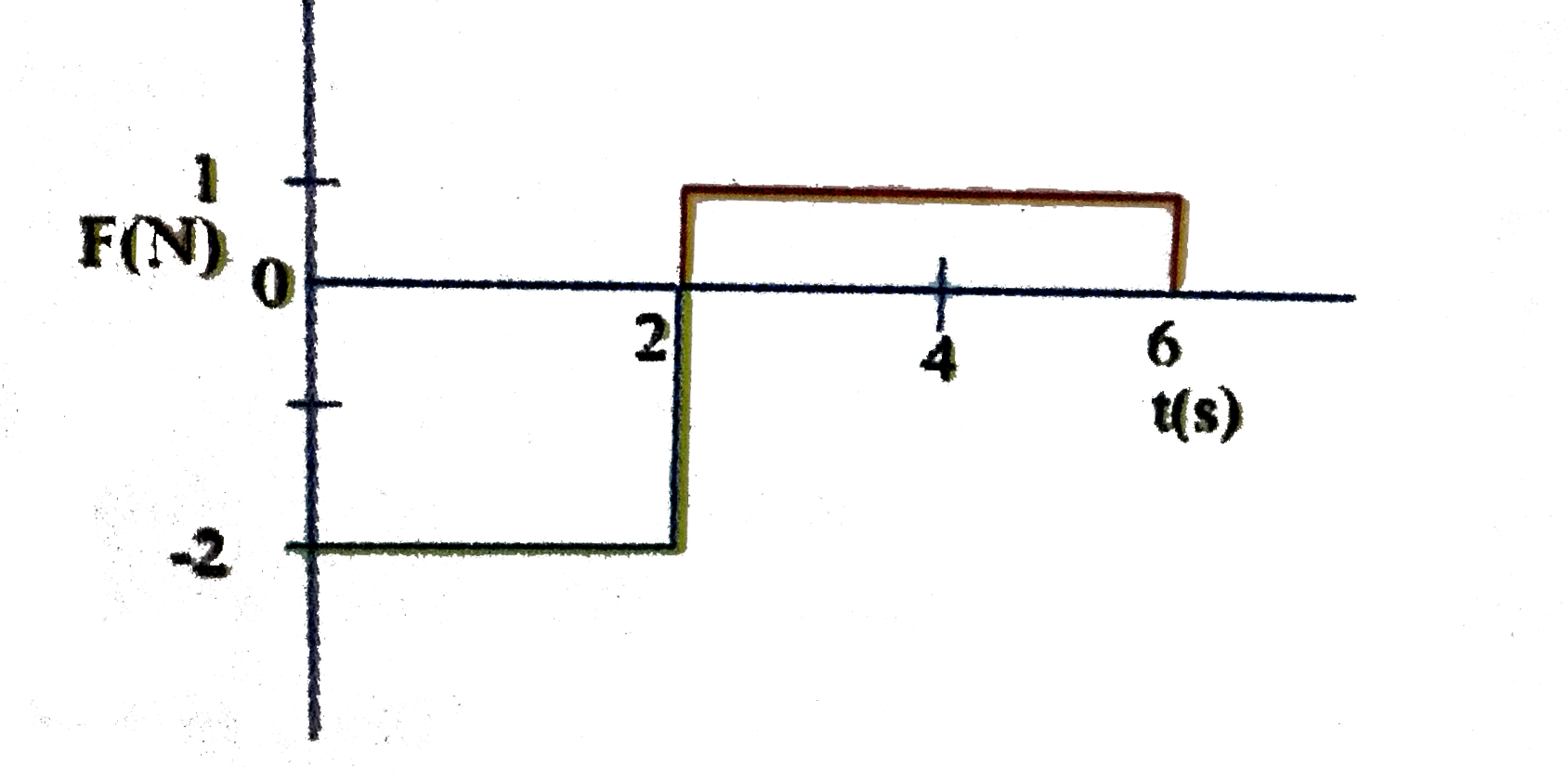 .
.
View SolutionAn object of mass ` 3 kg ` is at rest. Now a force of ` vec F = 6 t^2 hat I + 4 t hat j` is applied on the object, the velocity of object at `t= 3 s` is.
View SolutionAn impulse `vec(I)` changes the velocity of a particle from `vec(v)_(1)` to `vec(v)_(2)`. Kinetic energy gained by the particle is :-
View SolutionA `60kg` man is inside a lift which is moving up with an acceleration of `2.45_(ms^(-2))`. The appar-ent percentage change in his weight is .
View SolutionThe apparent weight of a man in a lift is `W_(1)` when lift moves upwards with some acceleration and is `W_(2)` when it is accerating down with same acceleration. Find the true weight of the man and acceleration of lift .
View SolutionA person of mass `60mg` is in a lift The change in the apparent weight of the person when the lift moves up with acceleration of `ms^(-2)` and the down with an acceleration of `2ms^(-2)` is (take `g =10 m//sec^(2)`) .
View SolutionA rope of length `10m` and linear density `0.5kg//m` is lying length wise on a smooth horizontal floor It is pulled by a force of `25N`. The tension in the rope at a point `6m` away from the point of application is .
View SolutionThere blocks of masses `m_(1)` , `m_(2)` and `m_(3)` are connected by may less unstretchable strings on a smooth surface. Tension `T_(2)` is.

View SolutionA horizontal force `F` pushes a `4kg` block `(A)` which pushes against a `2kg` block `(B)` as shown The have an acceleration of `3m//s^(2)` to the right There is no friction between the blocks and the surface on which they slide. What is the net force `B` exerts on `A`
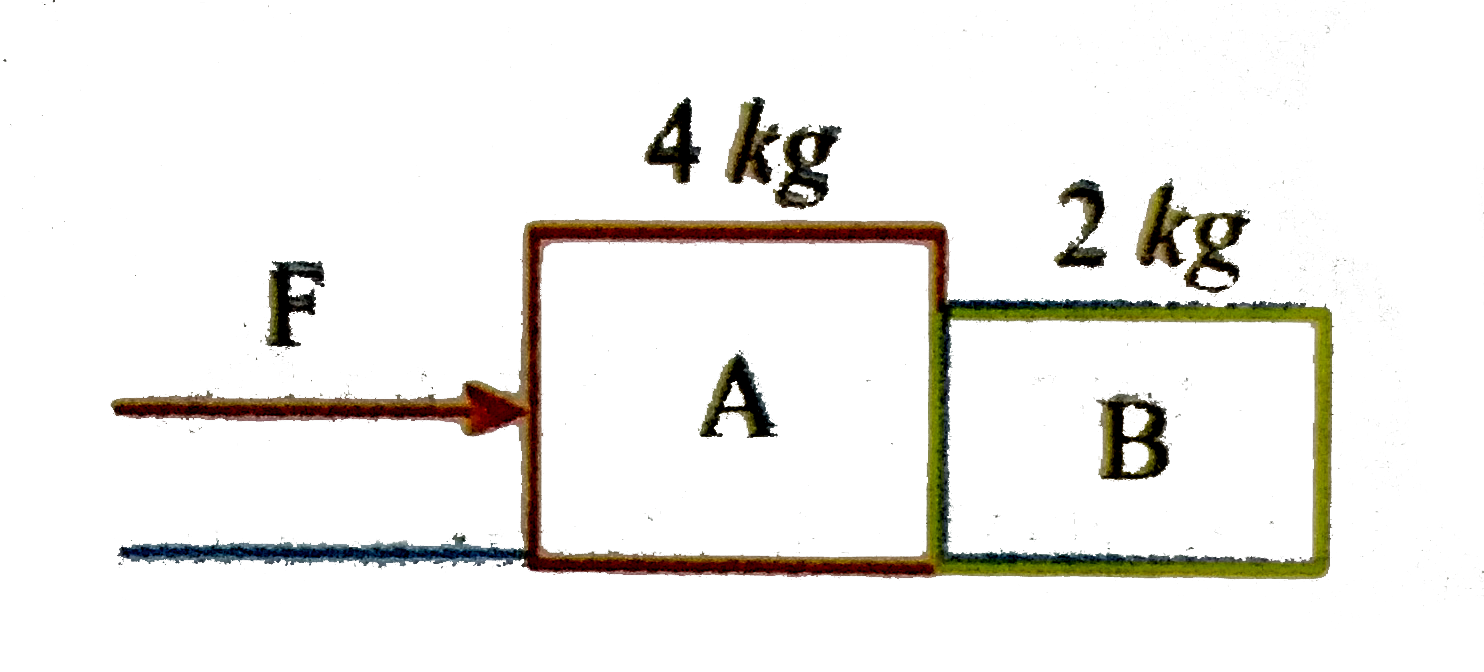 .
.
View SolutionTwo masses `m_(1)` and `m_(2)` are attached to a spring balance `S` as shown in figure. `m_(1) gt m_(2)` then the reading of spring balance will be .
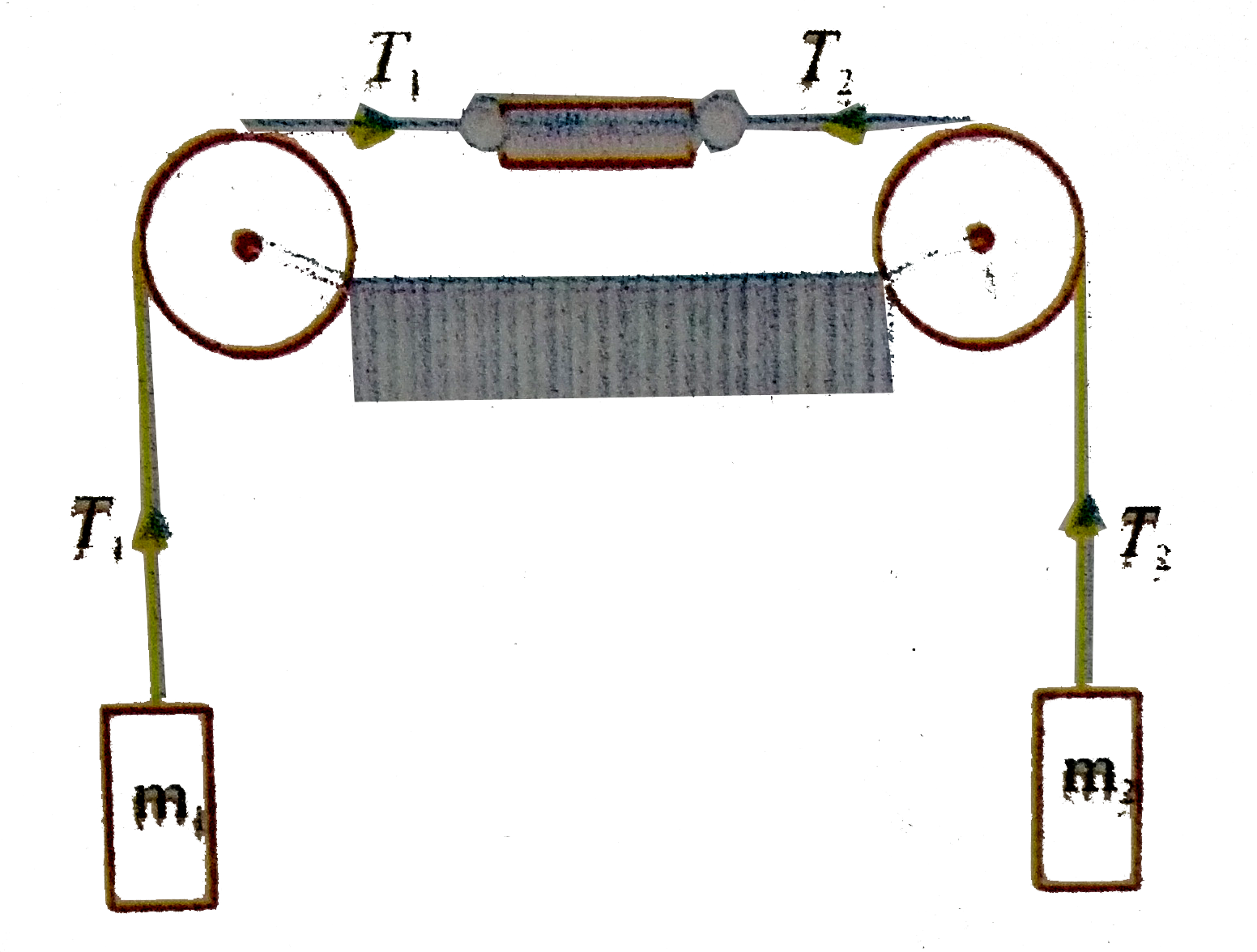 .
.
View SolutionThe masses `(M+m)` and `(M-m)` are attached to the ends of a light inextensible string and the string is made to pass over the surface of a smooth fixed pulley. When the masses are relased from rest the acceleraion of the system is .
View SolutionTwo bodies of masses `5kg` and `4kg` are tied to a string as shown If the table and pulley are smooth, then acceleration of `5kg` mass will be
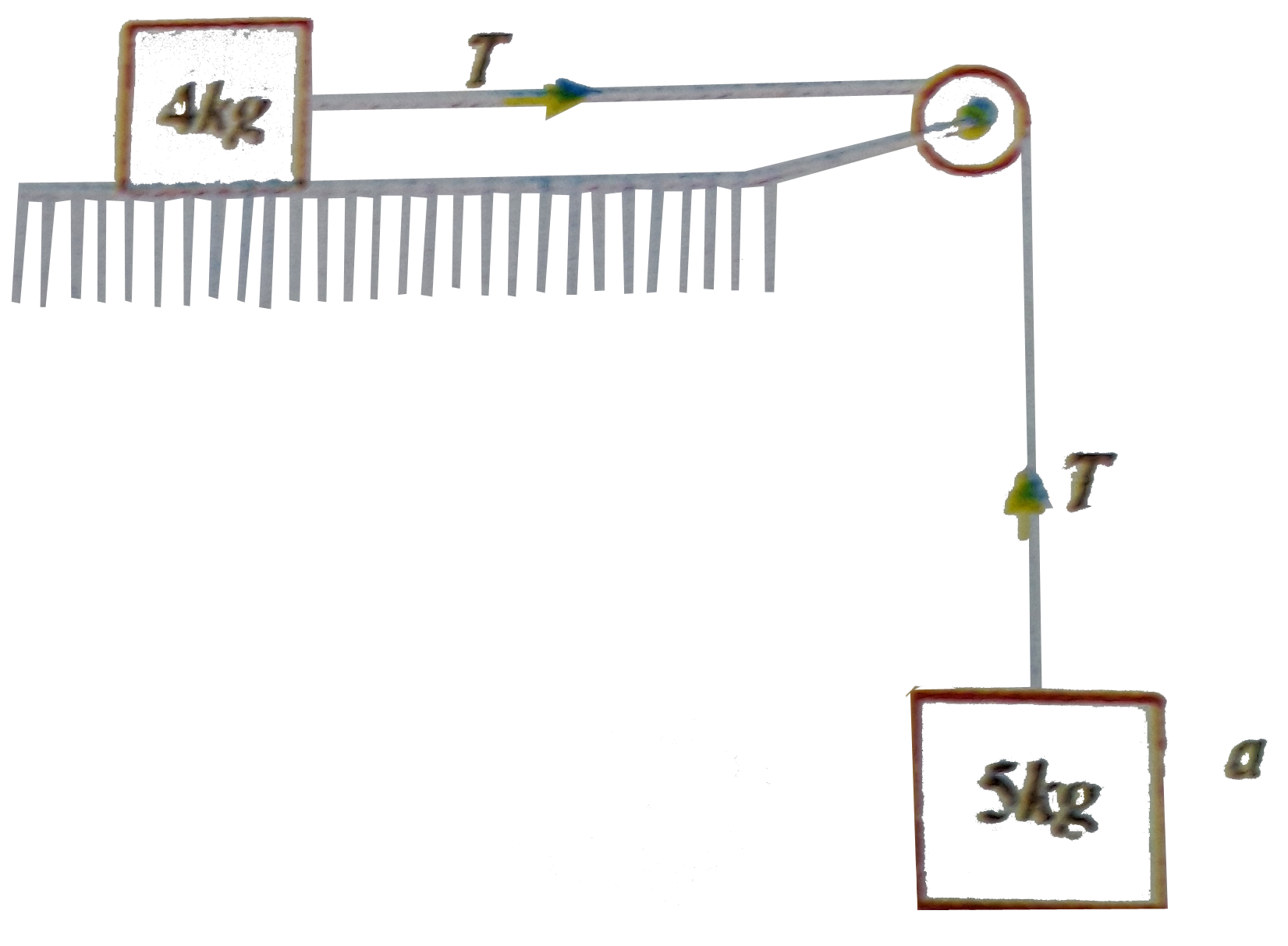 .
.
View SolutionThe object at rest suddenly explodes into three parts with the mass ratio `2:1:1`. The parts of other with equal speed 'v' the speed of the third part after explosion will be .
View SolutionA man and a cart move towards each other. The man weight `64kg` and the cart weighs `32kg`. The velocity of the man is `5.4km//hr` and that of the cart he jumps on to it The velocity of the cart carrying the man will be .
View SolutionA bomb of mass `6kg` initially at rest explodes in to three identical fragments On of the fragments moves with a velocity of `10sqrt3 hatim//s` another frament moves with a velocity of `10 hatj m//s` then the thired fragment moves with velocity of magnitude .
View SolutionA mass of `10kg` is suspended by a rope of length `2.8m` from a ceiling. A force of `98N` is applied at the midpoint of the rope as shown in figure. The angle which the rope makes with the vertical in equilibrium is
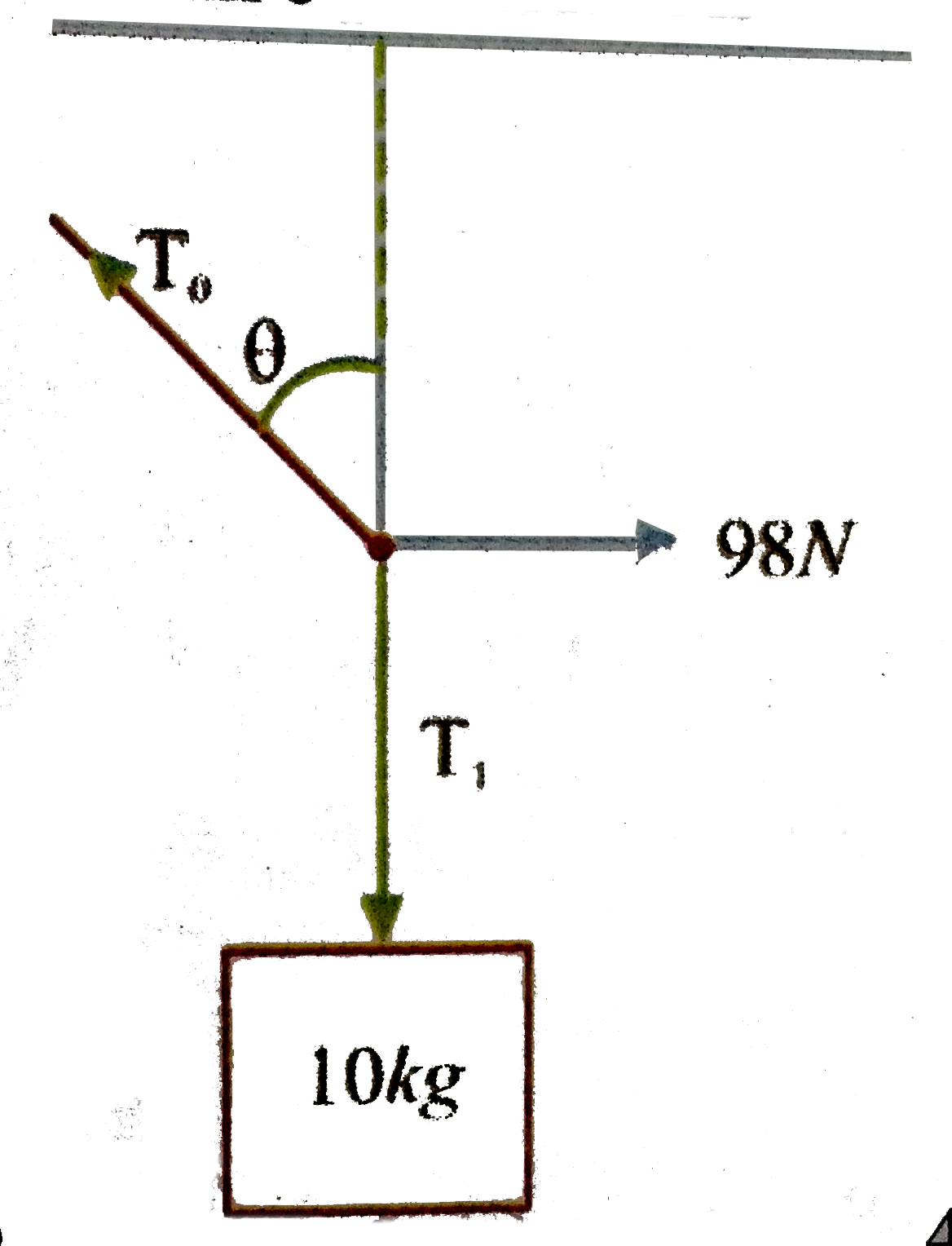 .
.
View SolutionA mass of M kg is suspended by a weightless string. The horizontal force that is required to displace it until the string makes an angle of `45^@` with the initial vertical direction is
View SolutionThe coefficients of static and dynamic friction are `0.7` and 0.4 The minimum force required to create motion is applied on a body and if it is further continued the acceleration attained by the body in `ms^(-2)` is (`g =10m//s^(2))` .
View SolutionThe coefficients of static friction between contact surface of two bodies is 1. The contact surface of one body support the orther till the inclination is less than
View SolutionBrakes are applied to car moving with disengaged engine, bringing it to a halt after `2s` Its velocity at the momnet when the breaks are applied if the coefficient of friction between the road and the tyres is `0.4` is .
View SolutionA book of weight `20N` is pressed between two hands and each hand exerts a force of `40N`. If the block just starts to slide down Coefficient of friction is .
View SolutionA car running with a velocity `72 kmph` on a level road is stoped after travelling a distance of `30m` after disengaging its engine `(g =10m^(-2))` The coefficient of friction between the road and the tyres is .
View SolutionIn the above problem car got a stopping distance of `80m` on cement road then `mu_(k)` is `(g = 10 m//sec^(2))` .
View SolutionA 10 kg mass is resting on a horizontal surface and horizontal force of 80N is applied. If `mu = 0.2`, the ratio of acceleration without and with frication is `(g = 10 ms)^(2)`
View SolutionA block of mass `20kg` is pushed with a horizontal force of `90N`. It the coefficient of static and kinetic friction are 0.4 and 0.3, the frictional force acting on the block is `(g =10ms^(-2))` .
View SolutionA force of `150N` produces an acceleration of `2ms^(-2)` in a body and a force of `200N` produces an acceleration of `3ms^(-2)` The mass of the body and the coefficinent of kinetic friction are .
View SolutionA heavy uniform chain lies on horizontal table top. If the coefficient of friction between the chain and the table surface is `0.5`, the maximum percentage of the length of the chain that can hang over one edge of the table is
View SolutionThe angle of inclination of an inclined plane is `60^(@)`. Coefficient of friction between `10kg` body on it and its surface is `0.2, g= 10ms^(-2)`. The acceleration of the body down the plane in `ms^(-2)` is .
View SolutionThe angle of inclination of an inclined plane is `60^(@)`. Coefficient of friction between `10kg` body on it and its surface is `0.2, g= 10ms^(-2)`. The acceleration of the body down the plane in `ms^(-2)` is .
In the above problem the frictional force on the body is .
View SolutionThe angle of inclination of an inclined plane is `60^(@)`. Coefficient of friction between `10kg` body on it and its surface is `0.2, g= 10ms^(-2)`. The acceleration of the body down the plane in `ms^(-2)` is .
In the above problem the minimum force on the body is .
View SolutionThe angle of inclination of an inclined plane is `60^(@)`. Coefficient of friction between `10kg` body on it and its surface is `0.2, g= 10ms^(-2)`. The acceleration of the body down the plane in `ms^(-2)` is
In the above problem the minimum, force required to pull the body up the inclined plane .
View SolutionWhen a body slides down an inclined plane with coefficient of friction as `mu_(k)`, then its acceleration is given by .
View SolutionA brick of mass 2kg begins to slide down on a plane inclined at an angle of `45^(@)` with the horizontal. The force of friction will be
View SolutionThe lengths of smooth & rough inclined planes of inclination `45^(@)` is same Times of sliding of a body on two surface `t_(1)t_(2)` and `mu =0.75` then `t_(1):t_(2)=` .
View SolutionA block of weight `200N` is pulled along a rough horizontal surface at contant speed by a force of `100N` acting at an angle `30^(@)` above the horizontal. The coefficient of kinetic friction between the block and the surface is .
View SolutionThe centripetal force required by a 1000 kg car that takes a turn of radius `50m` at a speed of 36kmph is .
View SolutionA stone of mass `0.5kg` is attached to a string of length `2m` and is whirled in a horizontal circle. If the string can withstand a tension of `9N` the maximum velcoity with which the stone can be whirled is .
View Solution
LEVEL -I (C.W) questions and complete solutions for chapter NEWTONS LAWS OF MOTION of NARAYANA PHYSICS (HINGLISH) of Class 11